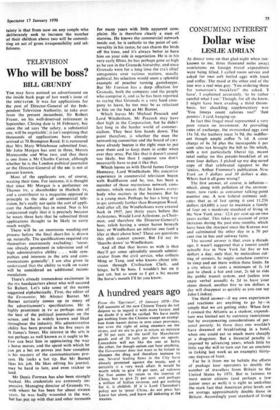TELEVISION
Who will be boss?
BILL GRUNDY
You may have noticed an advertisment on the inside back page of last week's issue of the SPECTATOR. It was for applications for the post of Director-General of the Inde- pendent Television Authority, to take over from the present incumbent, Sir Robert Fraser, on his well-deserved retirement in September. Closing date is 16 February, but since the ad says 'the salary, a substantial one, will be negotiable', it isn't surprising that thousands of applications have already arrived at 70 Brompton Road. It is rumoured that Mrs Mary Whitehouse submitted four, Mr John Morgan has sent in three, Messrs Morecambe and Wise two, and that there is one from a Mr Charles Curran, although whether he is the London political journalist or the Director-General of the BBC is not at present known.
Most of the applicants are, of course, wasting their time. For instance, it is thought that since Mr Morgan is a performer on Thames Tv, a shareholder in Harlech Tv, and a contributor to a magazine opposed in principle to the idea of commercial tele- vision, he's really not quite the sort of appli- cant the Authority has in mind. Nor is his conjectured reply that it is precisely because he wears three hats that he submitted three applications thought to be likely to carry much weight.
There will be an enormous weeding-out process before the final short-list is drawn up, naturally. The qualifications required are themselves enormously excluding: 'some- one already prominent in television and of high administrative ability . . . wide sym- pathies and interests in the arts and com- munications generally'. I am also given to understand that the ability to walk on water will be considered an additional recom- mendation.
There's already tremendous excitement in the rra headquarters about who will succeed Sir Robert. Let's take some of the names suggested alphabetically. First, the editor of the Economist, Mr Alistair Burnet. Mr Burnet certainly comes up to many of the advertisement's specifications. He is highly prominent in Tv as perhaps one of the best of the political journalists on the screen, and he is widely known and liked throughout the industry. His administrative ability has been proved in his five years in St James's Street. His interest in the arts is not perhaps as well known as it ought to be. Few can beat him in appreciating the way a horse moves, and the speed with which he can get a bet on proves just how complete is his mastery of the communications pro- cess. He looks a hot tip. But Mr Burnet likes his job. He likes editing his journal, may be hard to lure, and even trickier to land.
Mr Denis Forman has also been strongly backed. His credentials are extremely im- pressive. Managing director of Granada TV, with whom he has been for about sixteen years, he was badly wounded in the war, but has put up with that and other torments
for many years with little apparent com- plaint. He is therefore clearly a man of stamina. He knows the commercial network
inside out, he is catholic to the point of uni- versality in his tastes, he can charm the birds
off the trees, and it's always better to have him on your side in negotiation. He is in his very early fifties, he has perhaps gone as high as he can in the Granada hierarchy, and since Granada were for a long time the rra's chief antagonists over various matters, usually political, his selection would seem a splendid example of poacher turning gamekeeper.
But Mr Forman has a deep affection for Granada, both the company and the people who comprise it, and as he has been reported as saying that Granada is a very hard com- pany to leave, he too may be as reluctant to bite on the bait as Mr Burnet.
Which leaves Mr Michael Peacock and Lord Windlesham. Mr Peacock may have shot high in the Corporation, but he didn't last long in the harder world of commer- cialism. They beat him hands down. The point therefore, is whether the man the networking committee and the board of Lwr have already beaten is the right man to put over them and to keep them in order when ever they stray. Put like that it doesn't sound too likely, but then I suppose you don't necessarily have to put it like that.
Which leaves us with David James George Hennessy, Lord Windlesham. His executive experience in commercial television began with Rediffusion and he, too, has been a member of those mysterious network com- mittees, which means that he knows every- body who matters in the business. But he is a young man. Perhaps he has a long way to go; certainly farther than Brompton Road.
And after all, the Windleshams were created back in 1937, just thirty years before the Aylestones. Would Lord Aylestone, as Chair- man, and therefore the Director-General's boss, relish having a senior baron beneath him; or Windlesham an inferior one (and a lifer at that) above him? These are questions this pleb cannot answer. But I'd say its 'thumbs down' to Windlesham.
And all that that leaves us with is that they'll get some splendidly smooth admini- strator from the civil service, who collects Ming or Tang, and who knows about tele- vision through Civilisation Clark. and bingo, he'll be boss. I wouldn't bet on it just yet, but as soon as I get a bit nearer the horse's mouth I'll let you know.


































 Previous page
Previous page